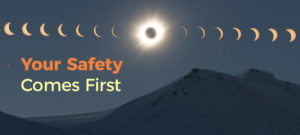 The following are safety tips for photographing the Solar Eclipse – by B&H.
The following are safety tips for photographing the Solar Eclipse – by B&H.
DO NOT look at the sun with your naked eyes. Permanent damage to your eyesight, and even blindness may result. ALWAYS wear properly certified solar viewing glasses when viewing the sun before, during, and after an eclipse. Do not use non-solar binoculars to aid in viewing the eclipse, even when wearing protective eye gear. During an eclipse, when the moon covers a portion of the sun, the intensity of the light remains constant.
DO NOT point a camera at the sun unless the optics are fitted with a properly certified solar filter. Optics can magnify the intensity and brightness of sunlight, and this can cause damage to you or your equipment.
DO NOT look through the viewfinder of an unfiltered SLR camera when it is pointed at or near the sun, because of the increase in brightness of the sunlight passing through magnifying optics.
DO NOT look through the viewfinder of a rangefinder camera when it is pointed at or near the sun, as the optical viewfinder will not protect your eyes from the sun’s damaging light.
DO NOT point an unfiltered digital camera at the sun and use live view or an electronic viewfinder, due to the possibility of focusing concentrated, unfiltered sunlight at your camera’s sensor.
Products should only be used for their intended purpose and in an appropriate manner. Misuse of products may cause serious injury and property damage.


Just to clarify for those that arent familiar with the lingo, DO NOT use a point and shoot camera either. Using live view, or an electronic viewfinder is not dangerous, but it will damage the sensor.
Solar filters are pretty much out of stock everywhere, but you can use #12 welders glass instead. -A B&H camera expert
If you could not get any of the solar eclipse glasses, Ocean County College is having an eclipse watching event with telescopes and glasses during the whole event. It is free and there is no registration.